Table Etiquette in the 1900s
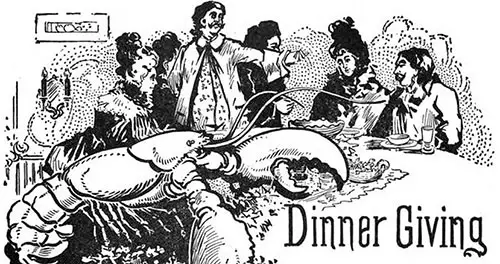
To give a dinner gracefully is an art which requires tact. No lack of harmony among the guests in attendance should mar the occasion.
The hostess must be, to a certain extent, acquainted with the peculiarities of each guest, and should carefully avoid seating two persons of opposite natures side by side.
The charming talker should be place near the equally charming listener; and the opinionated person in the vicinity of the guest with resilient disposition. It is generally understood that all present are desirable persons.
It is essential that a definite etiquette at the table is displayed to accompany the festive ambiance of the dinner.
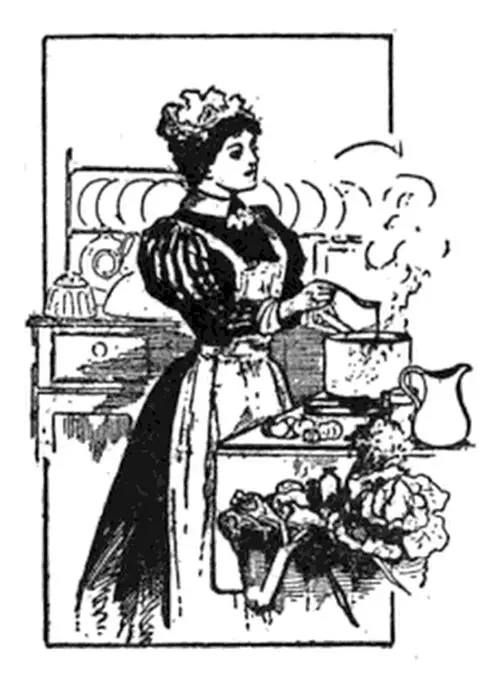
- A host or hostess should never allude to the quality of the dishes or contents—either is in poor taste. The guests will discover their excellence without assistance.
- If a guest does not care for a certain article do not press it upon him.
- Do not, in serving, overload the plates.
- Do not finger knife, fork, dishes or anything on the table.
- Do not overload the fork.
- Do not leave the knife and fork crossed on the plate when you have finished, but leave them parallel on the plate, the tines of fork down, the knife to the right and the sharp edge next to the fork.
- Do not, under any circumstances, put the knife in the mouth.
- Do not drink from the saucer.
- Do not rise from the chair to reach anything.
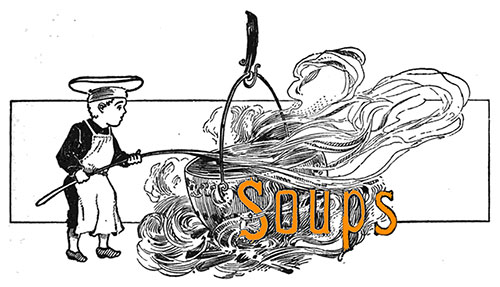
- Do not tip the soup-plate or put the end of the soup-spoon in the mouth, except when eating oyster-soup.
- Soup should be eaten from the side of the spoon and taken from the further side of the plate by moving the spoon from you.
- Close the mouth when chewing.
- Never make a hissing sound when eating soup.
- Never cut, bread, but break it, buttering each piece as it is eaten.
- Never reach across others.
- Bread should be buttered on the edge of the plate, never in mid-air.
- Olives should be taken with the fingers.
- The fork should be used for croquettes, patties and most made dishes, and must be used equally well in either hand. Never eat anything with a spoon that can be eaten with a fork.
- Do not hesitate to take the last piece.
- Do not move the chair, but seat yourself quietly.
- Look into, not over, the cup or glass when drinking.
- Never quite fill the spoon, it is bad form.
- A lady, if in a restaurant or hotel, rises when other stops to speak to her, even though she is seated at the table.
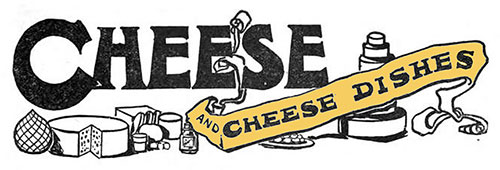
- A gentleman half unfolds his napkin and places it over the left knee.
- Do not mop the face with the napkin.
- Napkins should be unfolded below the level of the table and as unobtrusively as possible.
- Never tuck the napkin under the chin or in the waistcoat.
- Soft cheese may be put on the cracker with a knife. Hard cheese is taken in the fingers.
- If the host is carving, at a family table, it is not necessary to wait until all are served before beginning to eat.
- The spoon is used for berries and cream, stewed fruit, peaches and cream and soft desserts.
- Crackers or bread should not be broken into the soup but eaten from the fingers.
- Strawberries served with the stem, are eaten with the fingers.
- The fork should be raised laterally and not in such a fashion as to bring it at right angles to the mouth.
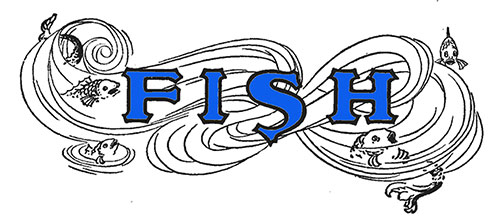
- The smaller knife, of two at the plate, should be used for fish.
- Never use a steel knife for fish.
- Side dishes of vegetables should be placed at the left and eaten with a fork.
- Never smear the meat with mustard or sauce of any kind; place it at the side.
- Never transfer the fork from one hand to the other.
- Never drink with the spoon in the cup.
- Do not leave the spoon in the cup after stirring coffee or tea but place it in the saucer.
- Do not rest the elbow on the table.
- The knife should be taken by the handle only, resting the forefinger on the upper part of the blade.
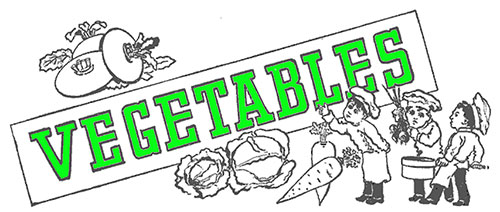
- The fork should be used for mashing and eating potatoes. Never touch potato with a knife, except to butter it.
- Ice cream may be eaten with either a spoon or ice-cream fork.
- Pass anything which you see is desired, even to a stranger.
- When through dinner the napkin should be left unfolded, unless at home.
- Ladies should always be served before gentlemen.
- Never place toothpicks on the table and never use a toothpick at the table.
- Never talk with the mouth full.
- Never take a piece of bread with a fork.
- Never put glasses on the table with the stems up.
- Never blow on soup or coffee to cool it.
- Never smack the lips.
- Never leave the table with food in the mouth.
- Never put salt on the table-cloth.
- Always eat slowly.
- Gentlemen should seat ladies first.
- Do not bend over the plate for each mouthful.
- Carry food to the mouth with an inward, not an outward, curve of the fork or spoon.
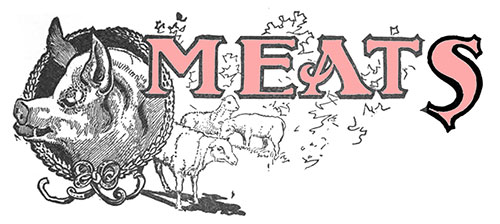
- Do not spread the elbows in cutting meat.
- Knives, forks and spoons should be placed on the table for all the courses except the dessert.
- Finger-bowls are filled one-third full of tepid water and are placed on the table only when fruit is eaten, and after a meal. The finger-tips only should be dipped in the finger-bowl.
- The handles of the knife and fork should rest in the palms of the hands.
- Do not tip up the glass or cup too much when drinking but keep it at a slight angle.
- Do not ask any one whether he wishes more potato, etc., but some potato.
- Do not reach after a knife, fork or spoon that is dropped but ask for another.
- Do not oblige the carver to make a selection for you when asked what part of the fowl you prefer, but answer promptly, giving your preference.
- Do not eat onions or garlic unless intending to remain alone.
- Do not eat after passing a plate for another to the carver, until the plate has been returned.
- Do not twist the feet around the leg^ of the chair.
- A crumb knife or fresh napkin should be used in brushing crumbs from the table.
- Never shove dishes on the table; always pass them.
- Never shove yourself from the table.
- Never touch the face or head at the table or fuss with the hands.
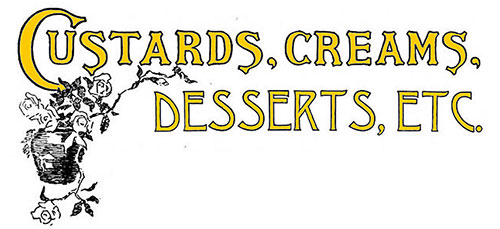
- Never suck an orange.
- Never spit seeds of fruit on the plate but take them out of the mouth with a spoon and lay them on the plate.
- Never take a larger mouthful than will allow you to speak with ease.
- Never hold the spoon so that the handle rests in the palm of the hand.
- Never loll back in your chair or lean against the table but sit upright.
- Never make introductions after the guests are seated.
- Never lift a glass by the rim; take goblets by the stem and tumblers
- near the bottom.
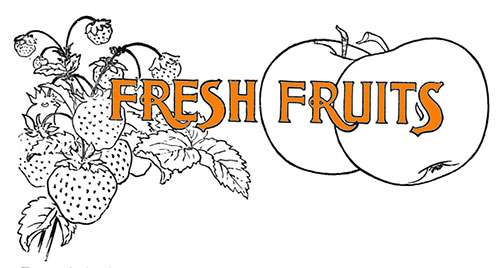
- Never ask whether any one will have some meat, but whether he will have roast beef, beefsteak, or whatever kind of meat is served.
- When asking for anything at the table mention the party's name when you speak.
- Do not give any one at the table the trouble of waiting upon you if there be a servant in the room.
- Do not, when at a private table, leave until all have finished.
- Gentlemen remaining for cigars, rise when the ladies do, and remain standing until they have left the room.
- Gentlemen allow the ladies to pass out first en masse, if all leave the dining-room.
- Wear evening dress at a formal dinner party. Wear gloves and do not take them off until seated at the table.
Annie R. Gregory, Woman's Favorite Cook Book,
From: Woman’s Favorite Cookbook – 1902
Edited by EBG
